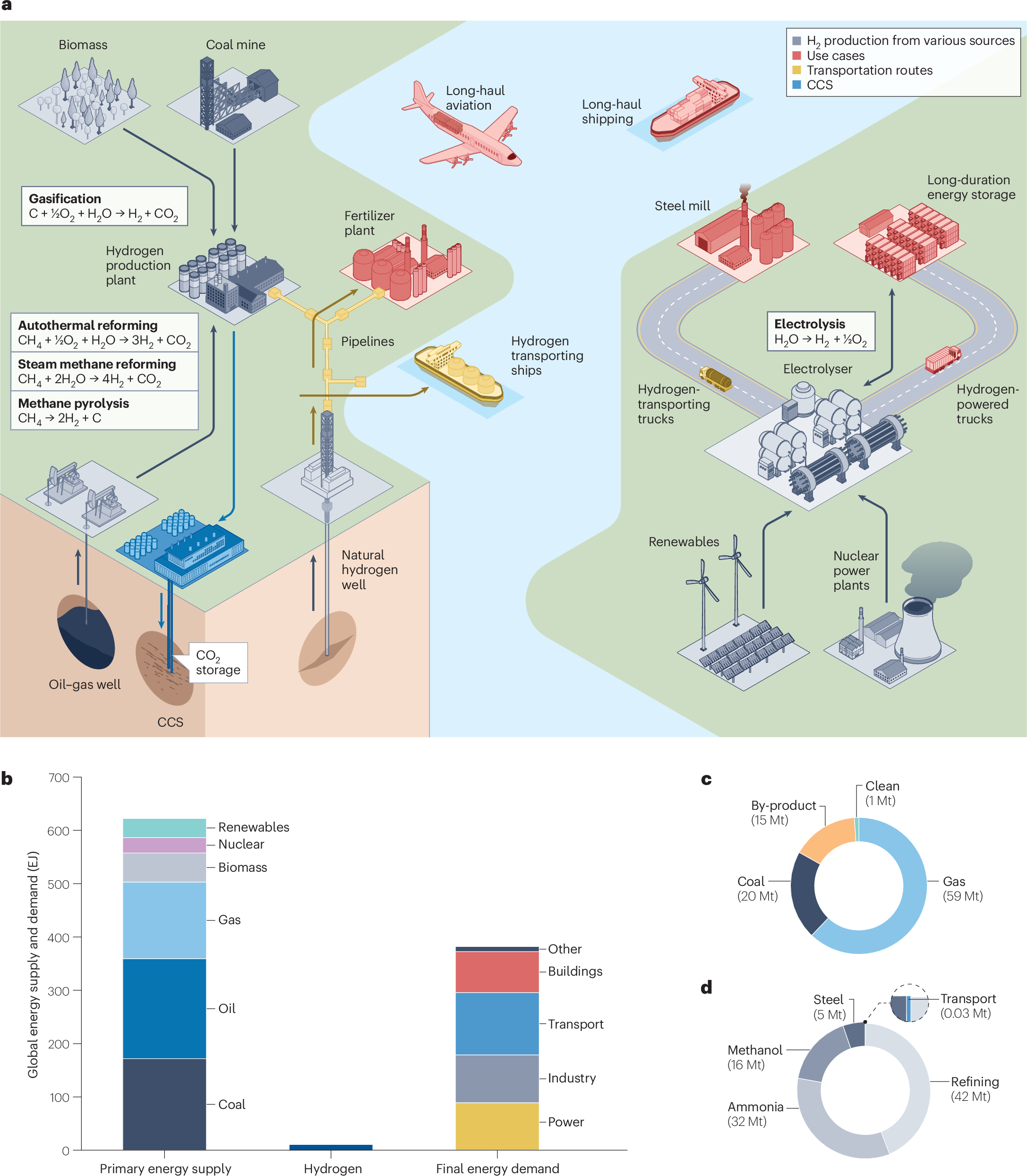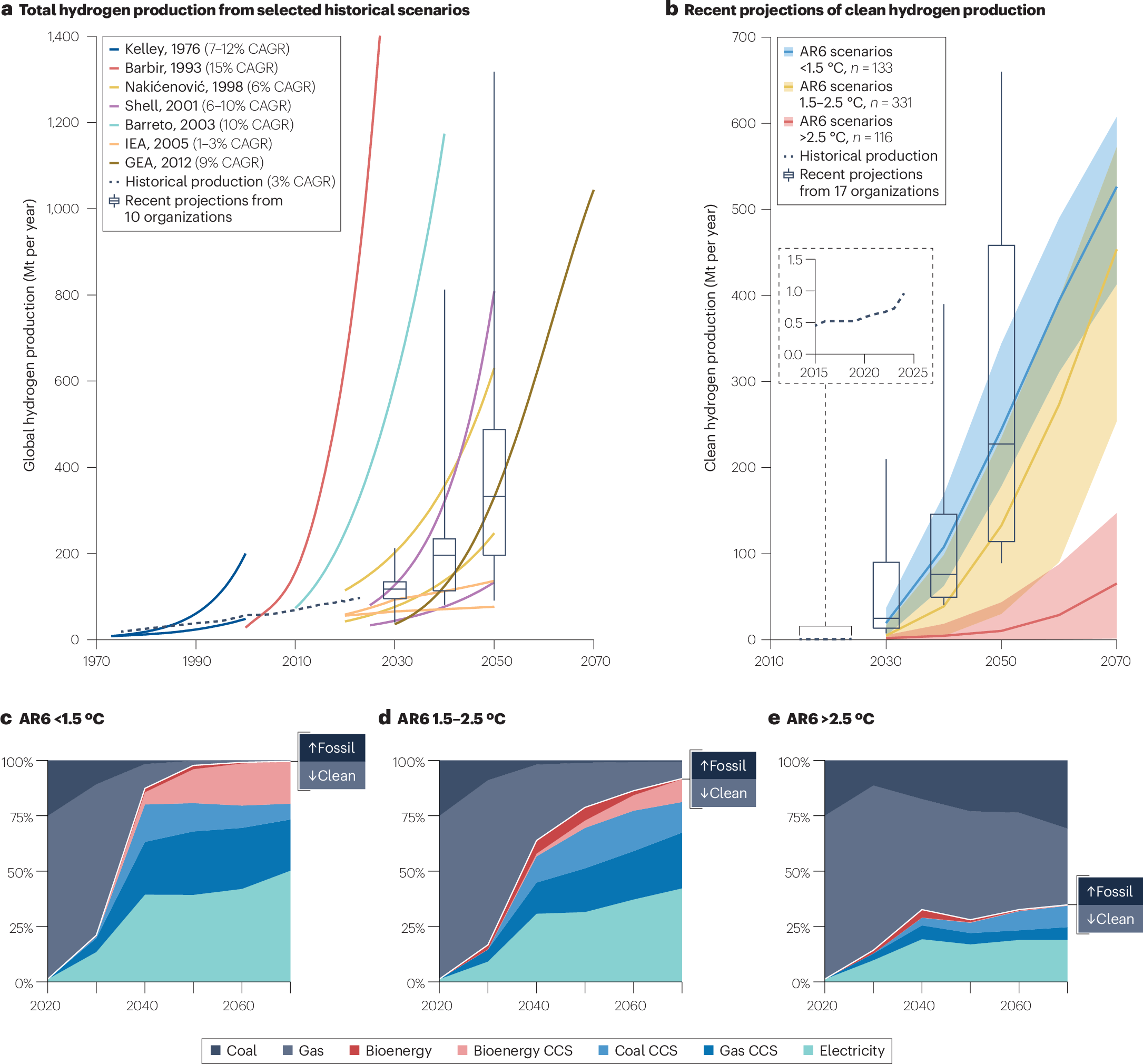Environment & Energy
Related: About this forumRealistic (?) roles for hydrogen in the future energy transition.
There's a new journal out from Nature Springer Nature Reviews Clean Technology, as if we need more journals.
It's off to a bad start in my opinion, since in the first issue it discusses hydrogen, which is decidedly not a "Clean Technology" and of course, since it's part of Nature.com, we risk hearing from the marketing staff for the fossil fuel industry, seeking to rebrand fossil fuels as "green hydrogen" that "Nature.com says..."
One hears these sort of things, and one doesn't really want to believe that one is actually hearing them, but we live in the age where ignorance is proud of itself, where lying to each other and to ourselves is very fashionable and in fact, socially acceptable.
Well, the journal would be off to a bad start, if it didn't have amusing parts of discussing hydrogen is if it were a "clean technology." The paper is this one: Johnson, N., Liebreich, M., Kammen, D.M. et al. Realistic roles for hydrogen in the future energy transition. Nat. Rev. Clean Technol. 1, 351–371 (2025). One of the authors is from the Department of Nuclear Engineering at Berkeley, but I recall, when I was surveying that Department to streamline my son's graduate school screening, I described the guy, somewhat sardonically thus:
That was a little harsh, probably not a bad guy, but still, not really a nuclear engineer despite being in the Nuclear Engineering Department. (My son declined to be interviewed at Berkeley, even though he applied and they did offer to fly him out, since he was offered a very good deal elsewhere and he certainly didn't want to rent a closet for a few Grand a month in which to live in the Bay Area.)
Probably the opening line of the abstract pretty much sums up the situation with continuous prattling about a putative "hydrogen economy:"
Further on it the text of the paper's body:
"Hype cycles...since the 1970's..." A promising locution. They are indeed "cycles" and they crop up like the heads on Hercules Hydra, but no Hercules is around to cauterize the heads so they don't come back. (In my lifetime I've probably seen four or five of these idiotic cycles.) Hydrogen didn't become "green;" it isn't "green;" nor will it ever be "green," no matter how many times it's identified as such. Wasting energy for no good purpose cannot be "green," and it is impossible, as defined by the inviolable laws of physics, to make hydrogen without wasting energy.
Still the hydra comes back, again and again and again.
The article begins with "key points" the first, which I paraphrase being that yes, hydrogen in theory could do a lot of stuff, but it is better and cleaner if clean electricity is available, but using clean electricity (if it exists, which largely it doesn't) is more wisely used as electricity.
I'll quote the second "key point" which has been true for all 50 years of the hydra's regular reappearance:
I've been making these points for years. I ain't Hercules, though. My fight against ignorance is extremely ineffective, I certainly can't cauterize this awful wasteful beast, the daydream (nightmare actually) of a "hydrogen economy." Of course, I put these issues crudely: "Hydrogen's physical properties suck and I have no idea why anyone would be enamored of a gas with such horrible properties."
Another "key point: "
Um, um, um, it takes energy to compress a gas, particularly one with notable incompatibility with materials, and absurdly low viscosity, and a critical temperature which is lower than every substance except the two isotopes of helium.
Another "key point: "
One unavoidably comes across people who want to claim that because periods extending a few minutes, even a few hours, exist where their is a surfeit of so called "renewable energy," it is somehow, economically and environmentally acceptable to build a huge expensive plant to make hydrogen. This is garbage thinking, but is connected with the mythology expressed in the paper's title that an "energy transition" exists. It doesn't exist. We are burning more fossil fuels than ever, which is reflected by the accelerating rises in the concentration of the dangerous fossil fuel waste CO2 in the planetary atmosphere. So called "renewable energy" hasn't done a fucking thing, at a cost of trillions of dollars, to make a dent in these rates of fossil fuel waste concentrations increasing. The sole purpose for the popularity of so called "renewable energy" has never been involved in attacking fossil fuels, since so called "renewable energy" is dependent on access to fossil fuels. The purpose has been only to attack the only sustainable form of energy discovered in all of human history, nuclear energy.
The paper has a few cool cartoons:
 ?as=webp
?as=webp
The caption:
CCS, carbon capture and storage, is another means of excusing the use of fossil fuels by claiming it's viable and realistic, which it hasn't been, isn't, and won't be. Of course, it fits right in to discussions of hydrogen, since hydrogen is another awful fantasy designed for, and only for, greenwashing fossil fuels.
By the way, there's a fun process described in the graphic, methane pyrolysis to give hydrogen and elemental carbon. This of course, requires heat, but in discussions of hydrogen, people are unashamed to propose perpetual motion machines. In the hydrogenation (in an industrial plant, not in a garage) of carbon dioxide to give methanol or the wonder fuel DME, in general, a side product is methane. In theory, but not in practice, this suggests a way to remove carbon from the atmosphere as a solid, separating methane from methanol or DME by compression or cooling, and pyrolyzing the methane to make more hydrogen and solid carbon.
(Don't try this at home; there's a huge explosion risk.)
Here's an amusing graphic reporting on the all the times that grand "hydrogen economy" predictions have been made, extending to the modern soothsaying, out to 2070, when a simple quadratic model based on the accumulation of atmospheric CO2 will be well over 600 ppm, should we keep on - as we are doing - lying to ourselves about "doing something" about the collapse of the planetary atmosphere:

The caption:
I ain't Hercules.
Comments on the material cost, ripping the shit out of the Earth for mines for stupid purposes:
...Material extraction and processing are environmentally degrading, releasing heavy metals, toxic and radioactive materials that contaminate air, water and soils165,166. Material selection critically affects the environmental footprint of electrolyser manufacturing167. There are similar concerns around the mineral requirements of solar PV and wind161,162. Batteries are particularly material-intensive (battery electric vehicles require six times more minerals than petrol or diesel vehicles)162, but although they require more critical minerals than hydrogen technologies, they require less rare-earth metals161,162.
And then there's that little matter of land use for so called "renewable energy" to hydrogen schemes:
Environmental justice? We don't need no stinking environmental justice... We only need bourgeois heaven, coloring ourselves "green" while covered in shit.
Frankly, I'm obviously disgusted with these awful ill-considered fantasies. I have lived long enough to understand that if there is one feature that accounts for humanity's on-going suicide, it is the capacity to lie to ourselves.
There is no such thing as an "energy transition" at this point, and there is no such thing as "green hydrogen." All discussion of these chimeras are delusional, criminally so.
Again, disgusting, really, really, really disgusting!
Have a nice day tomorrow.